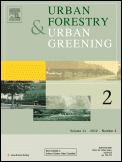
URBAN FORESTRY & URBAN GREENING
Scope & Guideline
Exploring the intersection of ecology and urban development.
Introduction
Aims and Scopes
- Urban Ecology and Biodiversity:
Research exploring the interactions between urban green spaces and biodiversity, including the effects of urbanization on species richness and ecosystem functions. - Health and Well-being:
Studies investigating the impact of urban green spaces on public health, mental well-being, and social cohesion, emphasizing the restorative potential of nature. - Climate Resilience and Adaptation:
Research focused on how urban greening can mitigate climate impacts, enhance resilience against extreme weather, and contribute to sustainable urban development. - Community Engagement and Equity:
Exploration of social dynamics, community involvement in urban greening initiatives, and the equitable distribution of green spaces in urban areas. - Innovative Urban Greening Practices:
Studies on new methods and technologies for urban greening, including green roofs, vertical gardens, and the use of native species for enhancing urban biodiversity. - Ecosystem Services Assessment:
Research assessing the ecosystem services provided by urban green spaces, including carbon sequestration, air quality improvement, and temperature regulation. - Policy and Governance:
Analysis of policies, frameworks, and governance structures that support urban forestry and green infrastructure implementation.
Trending and Emerging
- Nature-Based Solutions (NbS):
An increasing focus on nature-based solutions that utilize natural processes to address urban challenges, such as flooding and heat mitigation, showcasing the multifunctional benefits of urban greenery. - Digital Tools and Smart Technologies:
Emerging research on the application of digital tools, including remote sensing and GIS technologies, for urban forestry management and monitoring, facilitating data-driven decision-making. - Social Equity in Urban Green Spaces:
Growing emphasis on the social dimensions of urban greening, particularly concerning equitable access to green spaces and the involvement of marginalized communities in green initiatives. - Integration of Urban Agriculture:
An increasing trend towards integrating urban agriculture with urban forestry practices, focusing on food security, community engagement, and enhancing biodiversity. - Mental Health and Urban Nature:
A notable rise in studies linking urban green spaces to mental health benefits, particularly in the context of the COVID-19 pandemic, emphasizing the therapeutic value of nature. - Policy Development and Governance Frameworks:
Emerging discussions on the development of supportive policies and governance frameworks that facilitate the implementation of urban greening initiatives and enhance community collaboration. - Ecological Restoration in Urban Areas:
A trend towards researching ecological restoration practices within urban settings, aimed at enhancing biodiversity and ecosystem resilience in heavily modified landscapes.
Declining or Waning
- Traditional Urban Forestry Practices:
There has been a noticeable decline in research centered on traditional urban forestry practices, as the focus shifts towards more innovative, multifunctional approaches that integrate ecology and community needs. - Static Green Space Planning:
Research that emphasizes static or one-dimensional planning approaches for green spaces is waning, with increasing emphasis on dynamic and adaptive management strategies. - Single-species Focus:
Studies that concentrate solely on single tree species without considering biodiversity and ecosystem interactions are becoming less common as the importance of diverse plant communities is recognized. - Historical Analysis of Urban Green Spaces:
Papers focusing on historical analyses of urban greening practices are declining, possibly replaced by contemporary studies that address current challenges and solutions. - Over-reliance on Quantitative Data:
There is a noticeable decrease in the use of solely quantitative methods for assessing green space impacts, with a shift towards mixed-method approaches that include qualitative insights.
Similar Journals
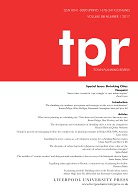
TOWN PLANNING REVIEW
Exploring the Future of Urban PlanningTOWN PLANNING REVIEW is a prestigious academic journal published by Liverpool University Press, focusing on pivotal research in the fields of urban studies and planning. Established in 1977, this journal has become a leading platform for the exploration of contemporary urban challenges and innovative planning solutions, aligning with its impressive Q1 rankings in both Geography, Planning and Development and Urban Studies. With a Scopus rank of 73 out of 279 in Urban Studies, it holds a strong presence in the academic community, making significant contributions to the scholarship and practice of town planning. Although it is not an open-access journal, it continues to reach a global audience by disseminating high-quality, peer-reviewed research. Researchers, professionals, and students interested in advancing their understanding of urbanization processes, planning methodologies, and policy implications will find TOWN PLANNING REVIEW an invaluable resource as it bridges theoretical insights and practical applications in the dynamic landscape of urban development.

URBAN ECOSYSTEMS
Illuminating the Interplay of Ecology and UrbanismURBAN ECOSYSTEMS is a prestigious journal published by Springer, focusing on the intricate relationships between urban environments and their ecological systems. With an ISSN of 1083-8155 and E-ISSN 1573-1642, this journal has established itself as a vital resource for scholars and professionals in the fields of ecology and urban studies. Recognized within the top category quartiles, it holds a distinguished Q1 ranking in both Ecology and Urban Studies as of 2023, placing it prominently in the global academic landscape. The journal’s extensive review of urban ecological phenomena helps to inform sustainable development and policy-making, bridging the gap between scientific research and practical applications. Additionally, it enjoys a favorable position in Scopus rankings, being ranked #38 out of 279 in Urban Studies and #86 out of 461 in Environmental Science. Researchers seeking to delve into the challenges and innovations of urban ecosystems will find URBAN ECOSYSTEMS to be an invaluable addition to their scholarly resources. Although it operates under a subscription model, the journal provides rich insights essential for enhancing our understanding of sustainable urban futures.
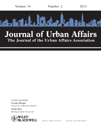
JOURNAL OF URBAN AFFAIRS
Illuminating the path for sustainable urban futures.The JOURNAL OF URBAN AFFAIRS, published by Routledge Journals, Taylor & Francis Ltd, is a premier platform for scholars and practitioners in the fields of Geography, Planning and Development, Sociology, Political Science, and Urban Studies. With an impressive convergence from 1979 to 2024, this journal has established itself as an essential resource, boasting a 2023 Q1 ranking across multiple categories, underscoring its relevance and academic rigor. The journal's commitment to advancing knowledge in urban policy, development, and social dynamics makes it a vital reference point for both contemporary research and practice within urban contexts. Existing as a key node in the academic dialogue, the *Journal of Urban Affairs* is dedicated to encouraging innovative methodologies and critical analyses, thus fostering a deeper understanding of urban environments worldwide. Although it does not operate under an open access model, the journal remains accessible to a wide audience of researchers, professionals, and students keen on exploring the intricacies of urban affairs.
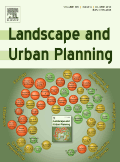
LANDSCAPE AND URBAN PLANNING
Advancing knowledge in landscape management and urban planning.Landscape and Urban Planning is a premier academic journal published by Elsevier, dedicated to the interdisciplinary study of urban environments and landscape management. With a strong focus on ecological, managerial, and policy-driven aspects of urban and landscape planning, this journal has achieved a remarkable recognition within its field, boasting a Q1 classification in multiple categories, including Ecology, Urban Studies, and Nature and Landscape Conservation, as evidenced by its impressive Scopus rankings. Researchers can access state-of-the-art studies and innovative methodologies that address contemporary challenges in urbanization and environmental sustainability. Since its inception in 1986, the journal has been instrumental in shaping the discourse on landscape and urban planning, making it an essential resource for academics, professionals, and students alike who seek to contribute to the sustainable development of urban areas. The journal's accessible content, backed by a strong editorial board and rigorous peer-review process, ensures that published findings remain at the forefront of research in these critical disciplines.

Blue-Green Systems
Transforming Environmental Management Through Insightful ResearchBlue-Green Systems is an esteemed journal in the realm of environmental science, published by IWA PUBLISHING. With an ISSN of 2617-4782, this journal serves as a vital platform for disseminating cutting-edge research on the integration of blue (water-related) and green (land-related) systems, focusing on sustainable solutions to pressing environmental challenges. Since its inception in 2019, the journal has rapidly established itself as a leader in the field, ranked in the Q1 category across three domains: Environmental Science (miscellaneous), Management, Monitoring, Policy and Law, and Water Science and Technology, with impressive positions of #25/261 and #22/219 in their respective Scopus Ranks. This remarkable visibility and high impact factor reflect its commitment to advancing knowledge in sustainable management practices and policies. Researchers, professionals, and students alike can access the journal's rich content to enhance their understanding of the integration between ecological and hydrological systems, pivotal for driving innovative strategies in environmental management. Based in the United Kingdom, Blue-Green Systems contributes significantly to the global discourse on environmental sustainability and innovation, making it an essential resource for those aiming to influence future policies and practices.
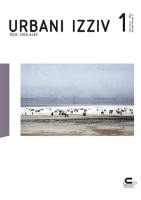
Urbani Izziv-Urban Challenge
Transforming Ideas into Urban SolutionsUrbani Izziv - Urban Challenge, a prominent journal in the field of urban studies and planning, is published by the Urban Planning Institute of the Republic of Slovenia. Established in 1993, this Open Access journal aims to foster the dissemination of cutting-edge research and innovative ideas in architecture, cultural studies, and urban development. With an impressive impact, it holds a Q2 ranking in both Architecture and Cultural Studies, while maintaining a solid presence in Geography, Planning and Development, and Urban Studies categories. As of 2023, it ranks within the top 25% of journals in the Cultural Studies discipline, highlighting its pivotal role in shaping urban discourse. Researchers and practitioners alike will find the journal an invaluable resource for exploring the intertwined challenges of urbanization, cultural evolution, and sustainable development. With an expansive convergence from 1994 to 2024, it continues to attract influential contributions that illuminate the dynamics of urban life in Slovenia and beyond.
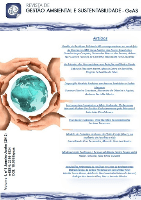
Revista de Gestao Ambiental e Sustentabilidade-GeAS
Advancing Sustainable Solutions for a Greener TomorrowRevista de Gestao Ambiental e Sustentabilidade-GeAS, an esteemed open-access journal published by UNIV NOVE JULHO in Brazil, focuses on critical issues related to environmental management and sustainability, fostering interdisciplinary research that spans Geography, Urban Studies, and Environmental Science. With its commitment to accessibility since 2012, GeAS serves as a vital platform for researchers, professionals, and students to disseminate knowledge and innovative solutions in the realm of sustainability. Although it currently holds a Q4 ranking in Geography, Planning and Development and Management, Monitoring, Policy and Law, and Q3 in Urban Studies as of 2023, the journal aims to elevate its impact within these fields. It is uniquely positioned to contribute to the dialogue on environmental issues, policy implications, and urban development challenges in a rapidly evolving world. The journal's location in São Paulo further enriches its relevance and expertise in addressing both local and global environmental concerns.
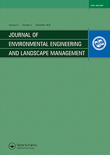
Journal of Environmental Engineering and Landscape Management
Exploring the Intersection of Nature and EngineeringJournal of Environmental Engineering and Landscape Management, published by VILNIUS GEDIMINAS TECH UNIV, serves as a pivotal platform for disseminating innovative research in the fields of environmental engineering and landscape management. With an Open Access policy since 2018, this journal fosters global knowledge exchange and accessibility, enhancing collaboration among researchers, professionals, and students alike. The journal, indexed under ISSN 1648-6897 and E-ISSN 1822-4199, features a diverse range of topics covering environmental engineering, management policies, and conservation strategies, thus contributing to sustainable development practices. As of 2023, it holds a Q3 quartile ranking across multiple categories, including Environmental Engineering and Nature and Landscape Conservation, demonstrating its commitment to excellence amidst competitive academic fields. The journal spans from 2004 to 2024, steadily solidifying its influence and relevance in shaping environmental discourse and practices. Join a vibrant community of scholars dedicated to addressing pressing environmental challenges through this distinguished publication.

Urbano
Connecting Ideas for Sustainable Urban DevelopmentUrbano is a distinguished academic journal published by UNIV BIO-BIO, DEPT PLANIFICACION & DISENO in Chile, specializing in Urban Studies. With the ISSN 0717-3997 and E-ISSN 0718-3607, it has been committed to open-access publishing since 2000, aiming to disseminate vital research and insights that contribute to the dynamic field of urban planning and design. The journal's impressive trajectory includes acceptance into Scopus, featuring a 2023 ranking of #162 out of 279 in the Urban Studies category, placing it in the 42nd percentile. Urbano serves as a platform for innovative ideas and interdisciplinary approaches, inviting researchers, practitioners, and students to engage with high-quality content from 2016 to 2024. By addressing contemporary urban challenges, it not only enriches academic discourse but also actively supports the development of sustainable urban environments across Latin America and beyond.
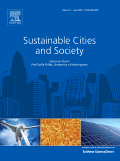
Sustainable Cities and Society
Pioneering insights for thriving, sustainable societies.Sustainable Cities and Society is a premier journal published by Elsevier, focusing on the interdisciplinary nexus of urban development, sustainability, and environmental challenges. With an impressive impact factor and recognized as a Q1 journal in multiple categories—including Civil and Structural Engineering, Geography, Planning and Development, Renewable Energy, Sustainability and the Environment, and Transportation—this journal stands out as a crucial platform for researchers, practitioners, and policymakers. The journal has been dedicated to advancing knowledge since its inception in 2011 and continues to be a vital resource for innovative solutions that foster sustainable urban environments. By featuring high-quality research, case studies, and reviews, it serves as an essential reference point for contemporary issues in urban planning and sustainable development. The journal's commitment to excellence is evident in its rankings, and it remains a go-to source for those invested in creating cities that are resilient, eco-friendly, and socially equitable.